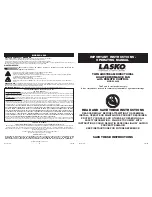
5.
Make the Electric
Connections
WARNING:
To avoid possible electrical shock,
be sure electricity is turned off at the main fuse box
before wiring.
NOTE:
This remote control unit is equipped with
16 code combinations to prevent possible
interference from or to other remote units. The
frequency switches on your receiver and
transmitter have been preset at the factory. Please
recheck to make sure the switches on the
transmitter and the receiver are set to the same
position, any combination of settings will operate
the fan as long as the transmitter and receiver are
set to the same position.(Figure 8)
Step 1.
(Figure 9) Insert the receiver into the
mounting bracket with the flat side of the receiver
facing the ceiling.
Step 2.
(Fig. 10) Motor to Receiver Electrical
Connections: Connect the Black wire from the fan
to Black wire marked "TO MOTOR L". Connect
the White wire from the fan to the White wire
marked "TO MOTOR N" from the receiver.
Connect the Blue wire from the fan to the Blue
wire marked "For Light" from the receiver. Secure
wire connections with the plastic wire nuts
provided.
Step 3.
(Figure 10) Receiver to House Supply
Wires Electrical Connections: Connect the black
(hot) wire from the ceiling to the black wire
marked "AC in L" from the receiver. Connect the
white(neutral) wire from the ceiling to the white
wire marked "AC in N" f r o m t h e R e c e i v e r.
S e c u r e t h e w i r e connections with the plastic
wire nuts provided.
Step 4.
(Figure 10) If your outlet box has a ground
wire (green or bare copper) connect it to the fan
ground wires; otherwise connect the hanging
bracket ground wire to the mounting bracket.
Secure the wire connection with a plastic nut
provided. After connecting the wires spread them
apart so that the green and white wires are on one
side of the outlet box and black and blue wires are
on he other side. Carefully tuck the wire
connections up into the outlet box.
NOTE:
Fan must be installed at a maximum
distance of 20 feet from the transmitting unit for
proper signal transmission between the
transmitting unit and the fan's receiving unit.
Figure 9
Receiver
Hanger
bracket
Figure 8
Code switch
TM

































